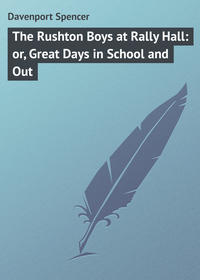Kitabı oku: «The Rushton Boys at Rally Hall: or, Great Days in School and Out», sayfa 10
Bir şeyler ters gitti, lütfen daha sonra tekrar deneyin
Türler ve etiketler
Yaş sınırı:
12+Litres'teki yayın tarihi:
16 mayıs 2017Hacim:
180 s. 1 illüstrasyonTelif hakkı:
Public Domain